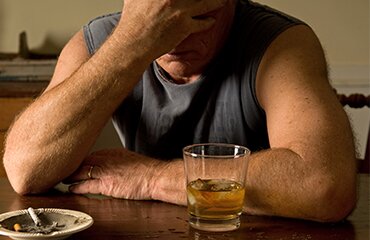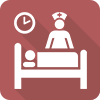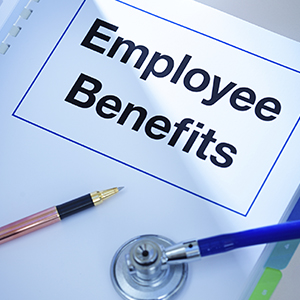- Do I Need Alcohol Rehab? Is There Alcohol Treatment?
- What to Expect from Alcohol Rehabilitation
- How Long Does Rehab Take?
- Types Of Rehab
- Paying For Rehab
- Does Insurance Cover Alcohol Rehab?
- What Happens After Rehab?
- How to Pick a Top Alcohol Addiction Rehab
What is Alcohol? Is Alcohol Addictive?
The problem of
alcohol addiction is not restricted to how much you drink, or to how often you drink, but rather to what happens when you drink.
It is about how drinking influences all aspects of your life, your job, your close relationships and your ability to functioning normally.
Do I Need Alcohol Rehab? Is There Alcohol Treatment?
Here are a few questions from the CAGE test (a widely used questionnaire to check for alcohol related issues) that you can ask yourself:
- Have you ever felt you should cut down on your drinking?
- Have people annoyed you by criticizing your drinking?
- Have you ever felt bad or guilty about your drinking?
- Have you ever had an eye-opener first thing in the morning to steady nerves or get rid of a hangover?
A score of 2 or 3 affirmative answers indicates that you may need some help.
Other Reasons to Consider Treatment
A few other reasons to consider rehabilitation are:
Therapists are Standing By to Treat Your Depression, Anxiety or Other Mental Health Needs
Explore Your Options Today
Ad
 You don't deserve the pain of addiction to alcohol. Find treatment options today.
You don't deserve the pain of addiction to alcohol. Find treatment options today.
- Prior Treatment: If you have had prior outpatient treatment and have relapsed, this does not mean you are a failure, but rather that you may need more intensive inpatient rehabilitation.
- Withdrawal: Alcohol withdrawal can have serious complications, like increased blood pressure and seizures (from glutaminergic rebound); so withdrawal from alcohol should be medically supervised in an inpatient setting.
- Heredity: Research has found a pattern of genetic markers in family members whose parents are alcohol-dependent. These may create a predisposition to alcohol addiction, resulting in a severe profile of addiction that requires intensive rehabilitation treatment.
- Co-Occurring Mental Illness: Some individuals are susceptible to alcohol addiction because they need to self-medicate mental health issues, like depression. Individuals with high rates of early trauma frequently use alcohol to cope.
- Co-Occurring Physical Illness: Co-occurring physical illnesses can increase the physical complications of withdrawal and require medical treatment, so inpatient rehabilitation is highly recommended in these cases.
It's important to consider your home environment and personal risks. Rehab might be the best option if:
- Your home environment is not conducive to recovery--because of access to alcohol or triggers that increase alcohol use.
- The risk of violence to oneself or others in the home.
- Risks of falling in the home if living alone (particularly for the elderly)
- Forgetfulness--if one forgets to take medications or suffers serious side effects due to alcohol intake with medications, rehab may be necessary.
What to Expect from Alcohol Rehabilitation
In the absence of a rehabilitation center in the community, an individual wanting to recover can go to the ER. Staff/case management will take care of referral to an inpatient/ outpatient rehab center.
Medications:
- Benzodiazepines such as lorazepam (Ativan) are very effective for relieving any severe symptoms such as seizures, and they help with agitation. The patient is gradually withdrawn/tapered off these meds.
- A patient will be given thiamine to help with symptoms of malnourishment that is common in alcohol addiction.
- While only about 5% of individuals with alcohol dependence will develop more than mild symptoms, this small population can present with chronic medical conditions, nutritional deficiencies and electrolyte abnormalities.
- Clonidine, marketed for high blood pressure, is useful and effective in reducing cravings.
- After detox, non-addictive medications such as naltrexone (Vivitrol) or acamprosate (Campral) can be prescribed to help maintain abstinence from alcohol. There is some evidence to support that they help with cravings and prevent relapse, although this may vary according to individual situations.
Psychological Therapies:
Cognitive-Behavioral Therapy
- The goal of cognitive behavioral therapy (CBT) is to help you understand the relationship between your thoughts, feelings and behaviors.
- According to research, a combination of CBT and medical treatment (like acamprosate or naltrexone) has been associated with a reduction in smoking, depression and an improvement in quality of life.
- This is important because comorbid smoking and alcohol abuse is extremely prevalent - as high as 85%.
- Alcoholics who smoke also report higher rates of depression, craving and sleep disturbances.
Motivational Interviewing
Motivational interviewing (MI) is a form of client-centered counseling, in which the therapist employs techniques like empathic listening and deals with the client's 'ambivalence' to change in a non-confrontational manner.
- Alcohol abuse and addiction frequently co-occurs with major depression and mood disorders.
- Research indicates that comorbid depression exists in up to 50% of alcohol abusing individuals.
- According to research a combination of CBT and MI has demonstrated effectiveness in populations with combined alcohol abuse disorder and depression.
- Recently, MI was also found to be more effective than a brief intervention following inpatient detox in lowering substance abuse rates after 6 months of treatment and greater involvement in 12-step groups.
- A 2012 study found that motivation enhancement therapy (MET) during alcohol detox was beneficial in getting patients to access subsequent treatment and aftercare services.
To
find a program that is right for you, call
1-888-993-3112Who Answers?. Out treatment support representatives are available 24/7to speak to you on a confidential basis.
How Long Does Rehab Take?
There is no set recommendation on how long one should stay in rehab; although research indicates better outcomes for longer stays. Rehab can consist of 30, 60 or 90-day inpatient or outpatient programs. Choosing the right length of treatment can depend on:
- Co-occurring mental or physical disorders.
- Number of previous attempts at either inpatient or outpatient treatment.
- Co-occurring substance use.
- Financial constraints.
It is important to remember that alcohol addiction is a 'chronic, relapsing illness', which means that relapse is considered a part of the recovery process, not a failure to achieve recovery.
Types Of Rehab
Residential and Inpatient

A
residential rehab facility has a highly structured environment that promotes:
- Engagement and stabilization in early recovery.
- Maintenance of abstinence.
- Transition to aftercare.
Research has demonstrated effectiveness for programs that incorporate:
- A comfortable and 'home-like' physical environment.
- A community-based orientation, where residents are encouraged to develop peer bonds, to help each other during recovery.
- Participation in group and individual therapy.
An inpatient rehab requires a 24-hour stay and provides the safest setting for detox for patients with prior history of acute withdrawal with seizures, or patients whose prior alcohol consumption has been very high and/or longstanding.
Outpatient

Outpatient rehab allows flexibility during the treatment process wherein patients are allowed to stay at home and meet with care providers a once a day or a few times a week, depending on their condition. Candidates for outpatient treatment should have only
mild to moderate withdrawal symptoms and
no severe medical or mental illness.
- Research has demonstrated completion rates as high as 70% for outpatient treatment with no medical complications.
It is also important to remember that there is a lack of standardized protocol measures to evaluate who may be more suitable for inpatient detox versus outpatient rehabilitation.
- This is further complicated due to a lack of randomized controlled trials comparing the effectiveness of inpatient vs. outpatient treatment.
- A study conducted in 1989 found no difference in abstinence rates after 6 months between inpatient and outpatient treatments.
Private or Luxury

These are residential programs located in beautiful settings to give you a
truly luxurious experience.
The fact that these are beautiful places with lots of amenities does not make them better than other facilities in treatment outcomes.
Executive

These facilities are residential, and the program of treatment is designed in such a way as to allow executives, e.g. CEO's, to continue their work and interact with business clients while in a residential treatment setting.
Other Treatment Approaches
Gender-specific programs have the advantage of helping the man or woman in treatment to engage in a program with the support of their own gender, e.g. women more likely have to deal with abuse issues and an all-women's program may reduce attrition and improve outcomes for this population.
LGBTQ-specific programs integrate evidence-based treatment while attending to issues such as same-sex relationships, violence, HIV-AIDS issues, and self-acceptance of sexual orientation.
Paying For Rehab
- Local faith communities are paying more attention to the impact of alcohol and drug addiction, and many have a funding budget than can be utilized.
- Employee benefits:
- Many places of employment can hire the services of professional counselors in treatment services and provide financial resources to help support the addict and his/her family while treatment progresses.
- You can ask your family and friends for a loan.
- With good credit history, it may be possible to secure a low-interest loan through your local bank or credit union.
- Consider digging into retirement plans.
- It may help to make a list of all available assets, including things associated with a former lifestyle that you don't need anymore. These can be sold to secure extra funding.
Does Insurance Cover Alcohol Rehab?
The
Affordable Care Act of 2010 and its extension of the 2008 Mental Health Parity and Addiction Equity Act recognize
substance use disorders and their treatment as an essential element of health service provision.
- Medicare (for those over 65) and Medicaid (for persons with low income) are part of the delivery system for this coverage. Such coverage must be offered as a benefit in all health plans.
Before choosing a specific rehab center, it is
necessary to know what is covered /not covered by insurance. So, find out:
- How many days are covered by insurance?
- Is there co-pay?
- Are there out-of-pocket expenses to pay?
- Are there specific requirements to be covered? (Like enrolling in an outpatient program before inpatient rehab)
What Happens After Rehab?
 Recovery support groups are great ways to stay on top of recovery. Find a meeting today.
Recovery support groups are great ways to stay on top of recovery. Find a meeting today.
Aftercare is critical especially for the first year after rehab. It can consist of weekly check-ins with the rehab facility simply to keep in touch and monitor progress and challenges, and may include ongoing group sessions around relapse prevention.
A transitional recovery home can provide much-needed community support for long-term recovery, especially if family members are not ready to have the addicted person return home yet.
Located within the community, the rental cost is often negotiable depending on employment and/or other resources such as Social Security disability (SSD) or Supplemental Security Income (SSI).
Attendance at Alcoholics Anonymous (AA) or other 12-Step meetings is encouraged to continue the journey of recovery.
How to Pick a Top Alcohol Addiction Rehab
Although this is not an exhaustive list, choices may be based on the following:
- Transportation to outpatient services, or ease of access for family members to inpatient centers where distance is an issue.
- Security/safety of inpatient/residential treatment in helping to prevent a relapse in early recovery.
- The provision of, or referral to, legal assistance, and other social service agencies as needed (Good Case Managers).
- Services that include family, and emphasize work and vocational issues of recovery.
- Detox centers that can initiate or continue treatment for co-occurring illnesses and/or dual diagnosis mental health issues.
- Insurance coverage, co-pay, and cost.
- The need for privacy.
- The use of evidence-based treatments for alcohol addiction as a medical illness.
Alcohol addiction is not only characterized by compulsions, but there is a sense of immense
loss of control. Rehabilitation can be a first-step to achieve individualized support and maintain sobriety.
You don't have to suffer. If you need treatment but don't know where to go, call
1-888-993-3112Who Answers? to speak to someone who can get you started down the road to recovery.
As advocates of mental health and wellness, we take great pride in educating our readers on the various online therapy providers available. MentalHelp has partnered with several thought leaders in the mental health and wellness space, so we can help you make informed decisions on your wellness journey. MentalHelp may receive marketing compensation from these companies should you choose to use their services.
MentalHelp may receive marketing compensation from the above-listed companies should you choose to use their services.
Ad







